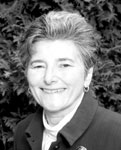|  College
President Series College
President Series
Dr.
Marlene Springer, President, College of Staten Island
By
Joan Baum, Ph.D.
Colleges
may be scooping up corporate heads for their presidencies but
for the last eight years at The College of Staten Island (CSI)
the CEO has been a Ph.D. in English Literature, who has an MA
in American Literature and an additional specialty in women’s
studies from Indiana University, Bloomington. The record also
shows an impressive list of scholarly publications and an extensive
history of teaching and administration in the academic world here
and abroad, including positions as vice chancellor for academic
affairs and graduate studies, associate dean, chair of department,
and service on national education commissions and memberships
on numerous and prestigious international, national and regional
boards, councils and committees.
Has this solid intellectual and academic background played a significant
part in Dr. Marlene Springer’s achievements at CSI? The response
is firm and focused, softened by a still discernible Southern
drawl and by a fast sense of humor. In fact, she points out, with
a lilt in her voice, when she was an undergraduate at Centre College
in Danville, Kentucky, she complemented her English major with
a minor in Business Administration. Later on, when she decided
that being head of a college was more important to her than becoming
president of Coca Cola, she took a “crash” course in administration
as a fellow at the University of Kansas where, among other mentors
in her life, she met Gene Budig, who left as Chancellor of the
University of Kansas to take up the leadership of the American
League. She admires that kind of wide reach.
There is also, of course, the simple fact of mettle: Marlene Springer
has spent a lifetime exercising independence in pursuit of convictions.
A stint in India when she was but 20 years old, on a Rotarian
fellowship, brought her to Calcutta all alone, prepared to study
Indian philosophy. She chuckles, recalling the actual “practice”
behind the “theory” of her visit: “everyone was on strike,” and
thus she spent a lot of time (“life changing experience”) joining
in celebrations for various Muslim and Hindu holidays, and at
one point, wound up working with Mother Theresa. This broad international
perspective has obviously served President Springer well in advancing
programs at CSI that stress excellence and diversity.
She will not be drawn into any one else’s curriculum vitae packaging.
More than her research and scholarship, more than her administrative
experience, Marlene Springer credits as her “most valuable” preparation
for the presidency of a comprehensive institution that awards
degrees at the associate, bachelors, Masters and Ph.D. level the
fact that she moved up through the ranks, at both smaller colleges
and research institutions. She has served “in every faculty position,
from part-time lecturer to visiting professor abroad.” To have
been a faculty person gives her, she says, insider appreciation
of promotions and tenure, not to mention credence among all professorial
ranks. In a forthcoming textbook, Pathways to the Presidency,
she reflects on her experience and views. Significantly, the book
will make its first appearance in China, where CSI has a strong
teacher-exchange program, particularly in the teaching of English
as a second language. In fact, CSI is the flagship school in CUNY
for international programs. The President pauses to note that
she just got back one and a half days ago [!] from Vietnam, where
she was lecturing.
Though she says the idea of finding a perfect “fit” between president
and college is a “myth,” it would seem that in selecting this
strong, independent woman to lead CSI the CUNY Board of Trustees
put in charge a unique person for a unique place. CSI is the only
public institution of higher education in a borough of 450,000
(approximately 75-78% of the student body is from Staten Island,
2,000-3,000 from Brooklyn, with a smattering of brave souls who
come from the Bronx, traveling three hours each way). CSI is also
the only college in the CUNY system that has been virtually rebuilt
on the grounds (and infamous reputation) of Willowbrook, thus
allowing for various program emphases, particularly undergraduate
research in the sciences, to enjoy significant space on the college’s
beautiful 204 acres. Dr. Springer’s flawless articulation of ideas
and examples suddenly takes enthusiastic flight. She is delighted
at the million-dollar microscopes, the science labs.
CSI is also unique, she adds, in its having had relative success
in merging the upper-degree experimental college it used to be
under the name of Richmond with the needs of an open-admissions
community college. CSI faculty in both divisions now are promoted
and granted tenure according to the same criteria; outdated associate-degree
programs have been dropped; new articulation agreements strengthened;
and the college’s largest major—teacher education, “600 teachers
a year”—is thus served with a strong liberal arts base. Standards
are up, she points out, placement scores higher, with a greater
number of students graduating. Retention, a nation-wide concern,
is being aggressively addressed.
Although Dr. Springer jokes about having good “pinnacle days”
she has obviously been enjoying a pinnacle professional life.
It was just a couple of weeks ago that she ended her tenure on
the Mayor’s City Charter Revision panel, having been surprised
at being appointed and then being made vice chair (“I think I
was the least politically connected,” she modestly avers). The
panel went out of business after the election and the Mayor has
not yet signaled reappointments. Surely her expressed desire to
collaborate with her fellow panel members, who included among
others Herman Badillo and Judah Gribetz, to recommend “a roadmap
for legislators to bring our great city into the 21st Century,”
reflected some of the mental and real-world traveling she has
done all her life.#

Education
Update, Inc., P.O. Box 20005, New York, NY 10001.
Tel: (212) 481-5519. Fax: (212) 481-3919.Email: ednews1@aol.com.
All material is copyrighted and may not be printed without express
consent of the publisher. © 2002.
|

